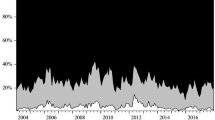Abstract
This paper investigates how inflation expectations of individuals are formed in India. We investigate if the news on inflation plays a role in the formation of inflation expectations following the epidemiology-based work by Carroll (Q J Econ 118(1):269–298, 2003). The standard literature on this topic considers news coverage by the print and audio-visual media as the sources of formation of inflation expectations. Instead, we consider the Internet as a potential common source of information based on which agents form their expectations about future inflation. Based on data extracted from Google Trends, our results indicate that during the period 2006–2018, the Internet has indeed been a common source of information based on which agents have formed their expectations about future inflation, and the Internet search sentiment has had some impact on inflation expectations. Additionally, based on the inflation expectations series derived from the Google Trends data, we find that there is presence of “information stickiness” in the system since only a small fraction of the population update their inflation expectations each period.




Similar content being viewed by others
Notes
https://www.statista.com/statistics/262966/number-of-internet-users-in-selected-countries/. Accessed on April 21, 2018.
https://www.livemint.com/Opinion/qHS04i31OfR8B4vskHVesJ/RBI-enters-the-exciting-new-world-of-Big-Data-analytics.html. Accessed on April 27, 2018.
It is to be noted that when we say that agents draw information from a common source like the Internet, it is not implied that people who have been surveyed about their inflation expectations have necessarily searched the Internet. In other words, there is no one-to-one correspondence between the response of the surveyed individuals and the individuals who searched the Internet. This is akin to the assumption in the standard epidemiology literature based on newspapers as a common source, where it is not the case that people who are surveyed about their inflation expectations have necessarily read the newspaper to derive information. We assume, like the newspaper is a source, the Internet is also a source of information and to show that the Internet is indeed a source based on which people form their expectations, we use the search statistic data provided by the Google Trends. Search statistics imply that people indeed have been using the Internet.
\( \beta = \gamma *\alpha_{1} \) and \( \mu_{t} = \varepsilon_{t} + \gamma \eta_{t} . \)
Results available upon request.
Results available upon request.
Here, we assume that in time period t, when agents are forming expectations about next period’s inflation, they do not have information on current period’s official inflation since it is published with a time lag. On the other hand, Google Trends is real-time data, and hence it is present in the current information set.
Results available upon request.
References
Afkhami M, Cormack L, Ghoddusi H (2017) Google search keywords that best predict energy price volatility. Energy Econ 67:17–27
Carroll C (2003) Macroeconomic expectations of households and professional forecasters. Q J Econ 118(1):269–298
Cho S, Sohn CH, Jo MW, Shin S-Y, Lee JH, Ryoo SM, Kim WY, Seo D-W (2013) Correlation between national influenza surveillance data and Google Trends in South Korea. PLoS ONE. https://doi.org/10.1371/journal.pone.0081422
Choi H, Varian H (2012) Predicting the present with google trends. Econ Rec 88(s1):2–9
Dergiades T, Milas C, Panagiotidis T (2015) Tweets, Google trends and sovereign. Oxf Econ Pap 67(2):406–432
Ehrmann M, Pfajfar D, Santoro E (2014) Consumer attitudes and the epidemiology of inflation expectations. Discussion paper no. 2014-029, Tilburg University, Center for Economic Research
Guzman G (2011) Internet search behavior as an economic forecasting tool: the case of inflation expectations. J Econ Soc Meas 36(3):119–167
Kermack WO, McKendrick AO (1927) A contribution to the mathematical theory of epidemics. Proc R Soc Lond A Math Phys Eng Sci 115(772):700–721
Lamla M, Maag T (2012) The role of media for inflation forecast disagreement of households and professional forecasters. J Money Credit Bank 44(7):1325–1350
Lei C, Lu Z, Zhang C (2015) News on inflation and the epidemiology of inflation. Econ Syst 39(4):644–653
Mankiw NG, Reis R (2002) Sticky information versus sticky prices: a proposal to replace the new Keynesian Phillips curve. Q J Econ 117(4):1295–1328
Naccarato A, Falorsi S, Loriga S, Pierini A (2018) Combining official and Google trends data to forecast the Italian youth unemployment rate. Technol Forecast Soc Change 130:114–122
Pfajfar D, Santoro E (2013) News on inflation and the epidemiology of inflation expectations. J Money Credit Bank 45(6):1045–1067
Author information
Authors and Affiliations
Corresponding author
Additional information
Publisher’s Note
Springer Nature remains neutral with regard to jurisdictional claims in published maps and institutional affiliations.
The authors express their gratitude to the Associate Editor-in-charge and two anonymous referees for their useful comments on an earlier version of this work.
Electronic supplementary material
Below is the link to the electronic supplementary material.
Rights and permissions
About this article
Cite this article
Saakshi, Sahu, S. & Chattopadhyay, S. Epidemiology of inflation expectations and internet search: an analysis for India. J Econ Interact Coord 15, 649–671 (2020). https://doi.org/10.1007/s11403-019-00255-4
Received:
Accepted:
Published:
Issue Date:
DOI: https://doi.org/10.1007/s11403-019-00255-4




